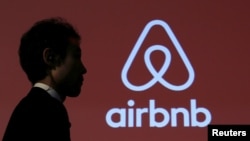They are being booted off or locked out of their websites. Some can no longer blog. Their electronic payment systems are being canceled. Even their music can't be heard.
For some white supremacist and neo-Nazi groups, operating online has become much harder in the wake of last week's "Unite the Right" protests in Charlottesville, Virginia, that resulted in violent clashes between extremist groups and counterprotesters.
On Thursday, the Daily Stormer, a neo-Nazi and white supremacist news site and one of the organizers of last weekend's demonstrations, was ejected from a Russian internet domain provider that was hosting its site.
The French news agency AFP quoted a statement from Alexander Zharov, the head of Russia's telecommunications watchdog Roskomnador, calling on the domain provider to stop hosting Daily Stormer.
The Daily Stormer had recently turned to the Russian firm after being knocked offline by its U.S. providers, first GoDaddy, then Google.
As of Thursday night, the Daily Stormer was not online.
Resisting the role of censor
While tech firms have been under government pressure to crack down on state-sponsored terrorist groups, they have mostly resisted efforts to play the censor when it comes to who uses their services. Their terms of use guidelines often outline restrictions, but they have traditionally declined to police offensive content.
In recent years, Facebook and other social media companies have cracked down on violations of their terms of service.
"We've seen the companies, particularly social media companies, really strengthening their terms of service against hate groups and terrorist propaganda in different ways," said Emma Llanso, director of the Free Expression Project at the Center for Democracy & Technology, a digital civil liberties organization. "There's a pressure coming from European governments to police this kind of material."
Still, Silicon Valley's general laissez-faire approach appeared to be changing after last weekend's demonstrations prompted by the rally's violence and the recognition that extremist groups rely on a host of digital services to organize.
But the shift comes with great ambivalence.
Potentially dangerous moves
CloudFlare, which makes websites secure and fast, decided to stop serving the Daily Stormer. But it wasn't an easy decision, wrote Matthew Prince, the firm's chief executive.
"Someone on our team asked after I announced we were going to terminate the Daily Stormer: 'Is this the day the internet dies?'"
On Thursday, the Electronic Frontier Foundation (EFF), a nonprofit that advocates for civil liberties in the digital world and one that has stood with tech companies in its battles with the U.S. government on surveillance, criticized the tech companies' actions.
"We strongly believe that what GoDaddy, Google and Cloudflare did here was dangerous," the organization wrote in a statement on its blog.
Tech companies, with few competitors, increasingly have more power to control online speech, EFF wrote, and "the consequences of their decisions have far-reaching impacts on speech around the world."
"Every time a company throws a vile neo-Nazi site off the Net, thousands of less visible decisions are made by companies with little oversight or transparency," EFF added.
Cutting off financial services
While Google, GoDaddy and Cloudflare refused to host the Daily Stormer site, other extremist groups and supporters were affected in other ways, such as where they could stay, how they exchanged money and the music they listened to.
Ahead of the protests, Airbnb banned users from staying in Charlottesville if it appeared they were coming for the protests.
PayPal said it does not allow groups such as the Ku Klux Klan or neo-Nazi groups engaged in "activities that promote hate, violence or racial intolerance" to use its service for processing payments. Apple Pay also pulled its services for groups selling far-right merchandise.
Spotify removed "hate bands" from its service.
WordPress, the blogging platform, cut off access to its site for Vanguard America, a group associated with James Fields, who allegedly drove his vehicle into a crowd of counterprotesters. He is charged with second-degree murder in the death of one woman and injuring nearly two dozen other people.
GoFundMe, a crowdfunding site, took down campaigns for assisting in Fields' legal defense.
Prince, of CloudFlare, wrote that making the decision to boot the Daily Stormer could change how the firm handles other takedown requests.
"Make no mistake, it will be a little bit harder for us to argue against a government somewhere pressuring us into taking down a site they don't like," he said.







